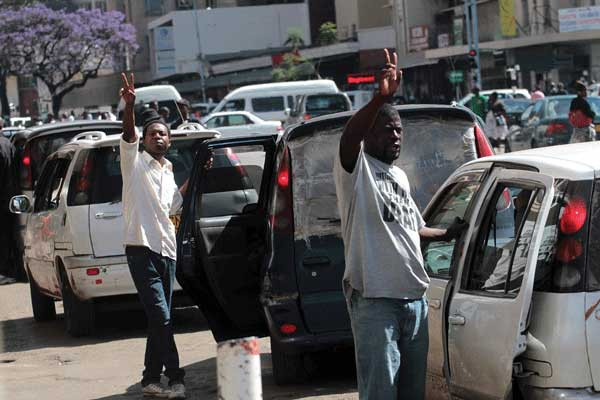
A total of 12 981 road traffic accidents were recorded nationwide between April and June this year, recently published Zimbabwe National Statistics Agency (ZimStat) data have shown.
The accidents, a 3.4%increase from 12,558 reported in the first quarter of 2023, claimed 514 lives, and left 2,567 injuries.
Compatriots let us face it, our roads are a mess.
These grim statistics, a significant increase from those of the first quarter, come at a time the Zimbabwe Republic Police (ZRP) launched an ongoing operation dubbed “Tame the Traffic Jungle '' on September 12 in a bid to bring sanity to the country’s ever perilous roads.
By October 23, when ZRP last published updates on the operation, some 104 633 arrests had been made on errant drivers with close to a third of the traffic offenders being illegal transport operators (pirate taxis) known in the streets as mushika-shika.
Additionally, 2 367 arrests had been made on vehicles without route permits while 31 141 arrests were made specifically on illegal pirate taxis.
Evidence on the ground suggests that high figures announced by the police are a drop in the ocean as chaos on the country’s roads, particularly in major cities like Harare, has persisted.
Despite heavy police presence and roadblocks, especially in the initial two weeks of the clampdown, traffic rule offenders have continued to find ways to be on the roads.
- Harare businesswoman turns heat on police CCU over 'bias'
- Letter to my people: Criminals are hiding in plain sight
- Thousands flee economic mess
- Crime tech: Technology can eradicate corruption
Keep Reading
This is a reality that begs the question whether the exercise is futile as has been the case for countless times in the past or a reflection of lax law enforcement?
Either the police are failing to do their job or the formal public transport system is in so much disarray that pirate taxis have taken up the role albeit through the back door.
Pirate taxis have been a long standing headache for the authorities and the public in the country, but a government ban on privately owned commuter omnibus in a bid to curtail the spread of Covid-19 at the beginning of 2020 exacerbated the problem.
The move saw a rise in the number of smaller private vehicles transporting commuters illegally to which the government reacted by introducing a law making it illegal to operate a mushika-shika.
Subsequently, the government forcefully incorporated private bus and commuter omnibus operators into the Zimbabwe United Passenger Company (Zupco) in a shoddy attempt to formalise the local transport structure.
However, the ill-thought deal fell apart and while that happened, pirate taxis continued to flourish.
Today, calls to abolish mushika-shika have fallen on deaf ears and this is not by choice for most travellers.
Although run illegally and most times dangerously, pirate taxis have proved to be integral in connecting a large chunk of inter- and intra- city travellers to their destinations.
This, at a time the formal system has fallen apart to the extent that it has become normal to see even uniformed police officers boarding pirate taxis at undesignated areas.
With the said traffic chaos showing no signs of ending any time soon while transport woes are at an all-time high, one wonders what it would take to regularise pirate taxis.
According to Section 7 of the Road Motor Transportation Act (Chapter 13:15): “No person shall operate a goods vehicle on any road or a passenger transport service on any road unless he is the holder of an operator’s licence authorising the operation or service concerned and where he is operating a stage carriage service, (or) he is the holder of a route authority issued in respect of that service and the goods vehicle which is being operated, or every vehicle with which the passenger transport service is being operated, as the case may be, is registered and licensed in terms of the vehicle Act; and there is a valid certificate of fitness in respect of the vehicle.”
Although well-meaning, the laws sound restrictive and, given the current circumstances on our roads, not in the interest of those who need public transport to move from point A to B.
In most cases, both legal and illegal transport operators say, the laws that determine formalisation are near impossible to achieve while maintaining a viable business, which makes conducting the business illegally more lucrative.
Perhaps the authorities could start by making it attractive to comply with the law and at the top would be introducing some sort of affordable tax system for pirate taxis to get a feel of compliance.
They are operating in defiance of the law anyways.
If anything, part of the money they get through their illegal operations goes towards bribing traffic law enforcers who then grant them free access to the country’s roads.
Famous scientist Albert Einstein once said: “Insanity is doing the same thing over and over and expecting different results.”
Perhaps it is time for the relevant authorities including the ministry of transport and law enforcers to rethink their approach on pirate taxis with a view of incorporating rather than flushing them out of the transport system.
After all, Section 66 (2) of the constitution dictates that every Zimbabwean citizen and everyone else who is legally in the country has “the right to move freely within Zimbabwe”, banning mushika-shika could be a subtle infringement of both transport operators and local travelers’ rights.
- *Kennedy Nyavaya is an award-winning journalist based in Harare. He writes in his personal capacity






